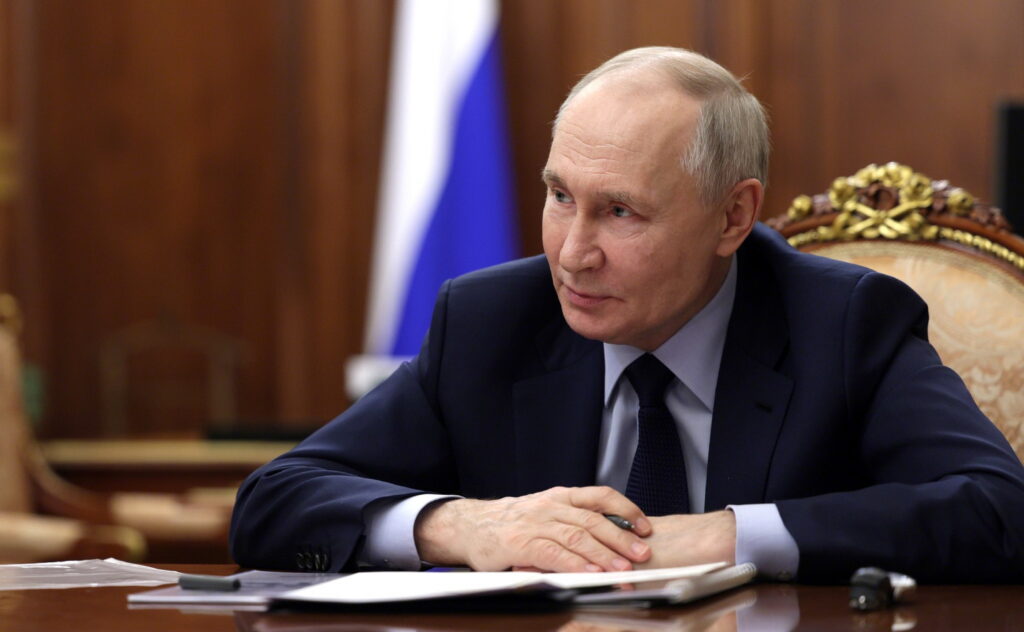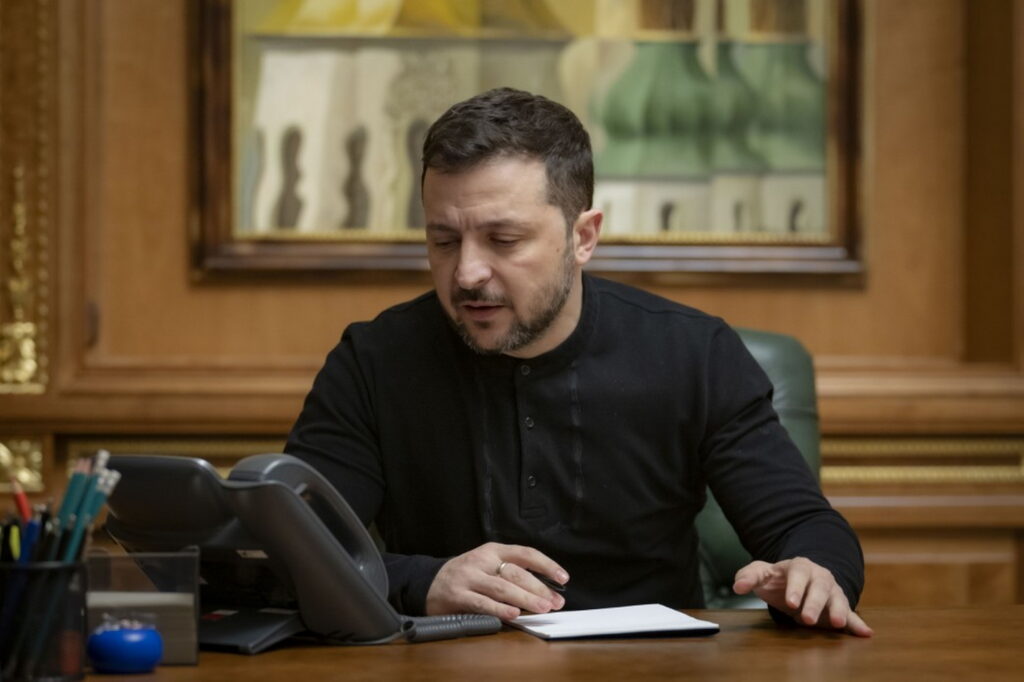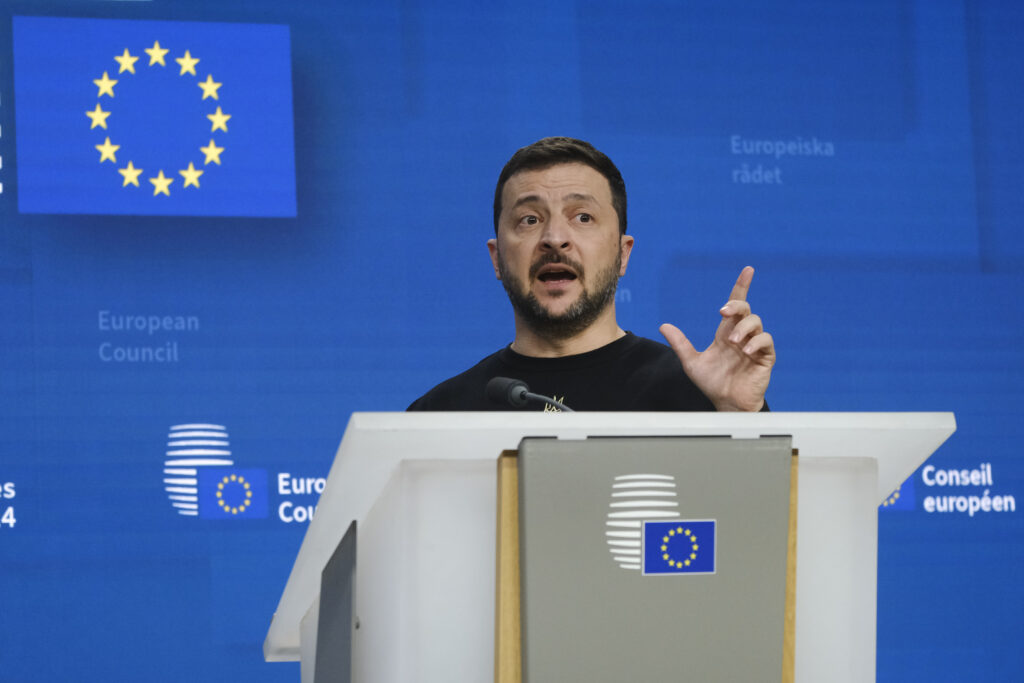Brussels – Suddenly, the end of the war in Ukraine seems closer. This is the effect of Donald Trump‘s return to the White House. Catching allies by surprise, the U.S. president has talked to his counterparts Vladimir Putin and Volodymyr Zelensky, both of whom would be willing to start peace talks as soon as possible. By taking the fate of the three-year war directly into its own hands, Washington is making it clear to the Europeans that from now on they will have to take greater responsibility for the security of the Old Continent. And that they can no longer take U.S. help for granted.
The conversation with Putin
The news broke last night (Feb. 12) like a time bomb. Taking half the world by storm, U.S. President Donald Trump announced he had had a telephone conversation with his Russian counterpart Vladimir Putin, the first publicly confirmed conversation between the two since the tycoon’s re-swearing-in. In the approximately 90-minute phone call, the leaders discussed how to end the war raging in Ukraine for nearly three years.
“I think we are on the road to peace,” Trump said. “We have agreed to work together, very closely, including by visiting each other’s nations,” has written the White House tenant on his social Truth, adding that he found the Kremlin chief’s backing to “get our respective teams to begin negotiations immediately.”

“People didn’t really know what President Putin’s thoughts were,” he added, “but I think I can say with great confidence that he also wants to see an end to this war,” called “ridiculous” in another passage. “We will work to bring it to an end, and as quickly as possible,” he assured, suggesting that a first high-level meeting could take place soon in Saudi Arabia. Putin himself has invited his U.S. counterpart to go to Moscow to negotiate.
The call with Zelensky
Right afterwards, Trump also called Ukrainian President Volodymyr Zelensky to inform him of his conversation with the authoritarian leader of the country attacking Kyiv. I think President Putin wants peace, President Zelensky wants peace, and I want peace,” he told reporters in the Oval Office.
The leader of the former Soviet republic declared that “no one wants peace more than Ukraine,” adding that “together with the United States, we will define the next steps to end Russian aggression and ensure a lasting and reliable peace.” Trying to put on a good face, Zelensky expressed confidence that “America’s strength is sufficient to put pressure on Russia and Putin to achieve peace.”
For Kyiv, the change of administration in Washington was impactful. The Ukrainians were not consulted by Trump’s team before the call to Putin. A sharp departure from the mantra, tirelessly repeated by the entourage of the previous president Joe Biden, of not discussing “anything about Ukraine without Ukraine”.

Negotiations imminent?
Trump also announced that his Vice President James David Vance and his Secretary of State Marco Rubio will hold ceasefire talks during the Munich Security Conference, scheduled for Feb. 14–16. Washington’s negotiating team will include CIA Director John Ratcliffe, National Security Advisor Michael Waltz and Special Envoy for the Middle East Steve Witkoff (while Keith Kellogg, who is also Special Envoy for Ukraine and Russia, has been left out).
This new course of star-studded diplomacy follows a prisoner exchange between Moscow and Washington the previous day, seen by the Kremlin as a demonstration of good faith between the two countries. U.S. teacher Marc Fogel was exchanged for Alexander Vinnik, a Russian money launderer who was in prison on computer crimes charges.
What peace for Kyiv?
The war in the former Soviet republic began 15 years ago. After the events of Euromaidan, in early 2014, Russia took control of Crimea and supported the Donbas separatist militias, and then integrated them into the regular army in September 2022, when in a referendum never recognised by the West, it annexed the (partially) occupied Ukrainian regions. Kyiv, which has long failed to achieve significant success on the ground within its borders, captured a small portion of territory in the Russian oblast’ of Kursk last August.

U.S. Secretary of Defense Pete Hegseth at the Ukraine Contact Group meeting at NATO Headquarters in Brussels, Feb. 12, 2025 (photo: NATO)
This, in a nutshell, is the situation from which ceasefire negotiations are to begin, which, in Trump’s hopes, should quickly lead to a lasting truce and a subsequent peace treaty. In this regard, U.S. Secretary of Defense Pete Hegseth—visiting NATO headquarters in Brussels for a two-day Contact Group for Ukraine (whose leadership has just switched from Washington to London) between yesterday and today—was particularly clear on at least three issues.
First, Ukraine must give up on regaining all the land that has fallen into Moscow’s hands (a corridor from the Donbas to Kherson, extending about one-fifth of its territory) and the hope of returning to the pre-2014 borders, which Hegseth called an “unrealistic goal. “Pursuing this illusory goal will only prolong the war and cause further suffering,” Hegseth said flatly.
Second, “the United States will not support Kiev’s accession” to the Atlantic Alliance “as part of a peace negotiation.” Third, whatever form they take, the infamous security guarantees long requested by Zelensky will not involve the U.S. military, and any peacekeeping mission will have to take place outside the NATO umbrella.
For his part, the Ukrainian president is trying to ensure Trump’s continued involvement by offering him a sort of preemption regarding access to Ukraine’s generous mineral resources. Not coincidentally, in the hours when Hegseth in Brussels was reversing the approach followed by the White House over the past three years, his colleague in charge of the Treasury, Scott Bessent, was in Kyiv and pointed out that such a deal (worth an estimated $500 billion) could prove to be a “security shield” for the former Soviet republic once the war is over.

However, the history of relations between Russia and Ukraine is not encouraging. In 1994, the Budapest Memorandum had enshrined Moscow’s commitment to respect the sovereignty and territorial integrity of Kyiv in exchange for the renunciation of Soviet nuclear warheads in the state that had just gained independence. After the onset of the war in the Donbas, the Minsk Agreements (two separate protocols signed between 2014 and 2015) were supposed to lead to a recomposition of the crisis. Still, they remained unimplemented and did not serve to prevent the large-scale invasion of 2022.
And Europe?
The European allies of Kyiv seem to be mainly interested in the stability of any diplomatic solution, as emphasised by the Secretary General of NATO, Mark Rutte, who cited the Minsk protocols as an example of a non-lasting peace.
But the events of the last few hours have made the Twenty-Seven realize that the tune in Washington has irrevocably changed. No more preemptive consultations between the two sides of the Atlantic, but rather a fait accompli approach and a muscular, transactional posture to international relations. Nothing new, on closer inspection, but what worries European chancelleries is the speed with which the situation has “precipitated”.

The leaders of the Old Continent feel sidelined by their powerful ally, whose support is proving less predictable than expected. And they try to be vocal. But it is an almost muted voice. The defence ministers of France, Germany, Italy, Poland, the UK, and Spain (meeting yesterday in Paris in the Weimar+ format) have reiterated like a broken record that Europe must continue to be involved in the peace process in Ukraine and that it is crucial to increase support for Kyiv in order to put it in a strong position.
Commission Chairwoman Ursula von der Leyen has not yet commented on the phone call between Trump and Putin, while Anitta Hipper, spokesperson for the EU Foreign Affairs Executive, stressed that “Russia cannot be rewarded for its aggression.” For chief spokeswoman Paula Pinho, the call between the U.S. and Russian leaders marks “the beginning of a process” that will have to be followed closely but whose outcome is not predetermined, regardless of how clear it is that “the security of Ukraine is the security of the EU.”
“Peace can only be achieved together: with Ukrainians and with Europeans,” German Annalena Baerbock remarked from the transalpine capital. “If there is peace, we need security guarantees so that it is fair and lasting,” reiterated the host Jean-Noël Barrot, for whom “we are very much attached to a Ukrainian path to NATO.” More conciliatory with the White House was Italy’s Antonio Tajani, who (absent from the Paris meeting) was keen to emphasize the importance of “the U.S. and Russia getting back to talking to each other at the highest level” as well as the need “for all of us Europeans to work together and united, with the U.S., to bring peace back to our continent.”
There will be no just and lasting peace in Ukraine without the Europeans.
In Paris tonight, I’m bringing together @kajakallas, @jmalbares, @sikorskiradek, @ABaerbock, @DavidLammy, @KubiliusA and @tripodimaria to talk about European security and our support for Ukraine. @andrii_sybiha
– Jean-Noël Barrot (@jnbarrot) pic.twitter.com/SSMlPsBicv
The problem lies right here. Washington does not seem willing to extend its negotiations with Moscow to Brussels (or London, which has also been among Ukraine’s staunchest supporters), and it is also unclear what the level of Kyiv’s involvement will be. Instead, as Hegseth points out, the White House expects the Europeans to provide “the bulk of future assistance to Ukraine.“
This includes sending soldiers to the ceasefire line to keep the truce standing, an endeavour that France and Poland have recently begun to discuss. Still, Zelensky believes it is destined to fail without U.S. support. Trump actually wants to scale back U.S. engagement in the entire Eurasian quadrant. Hegseth again remarked that it is time for the Europeans to “come out and take responsibility for conventional security on the continent.”
English version by the Translation Service of Withub








